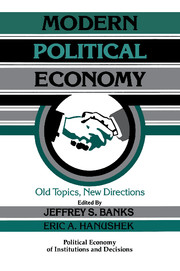Book contents
- Frontmatter
- Contents
- List of contributors
- Series editors' preface
- Preface
- Introduction
- 1 The economics and politics of regulation: perspectives, agenda, and approaches
- 2 Regulatory commitment and utilities' privatization: implications for future comparative research
- 3 The political economy of transformation: liberalization and property rights
- 4 Politics and trade policy
- 5 Elections, party structure, and the economy
- 6 The politics and economics of budget deficit control: policy questions and research questions
- 7 Law, legislation, and positive political theory
- 8 The rational choice theory of social institutions: cooperation, coordination, and communication
- Index
1 - The economics and politics of regulation: perspectives, agenda, and approaches
Published online by Cambridge University Press: 07 May 2010
- Frontmatter
- Contents
- List of contributors
- Series editors' preface
- Preface
- Introduction
- 1 The economics and politics of regulation: perspectives, agenda, and approaches
- 2 Regulatory commitment and utilities' privatization: implications for future comparative research
- 3 The political economy of transformation: liberalization and property rights
- 4 Politics and trade policy
- 5 Elections, party structure, and the economy
- 6 The politics and economics of budget deficit control: policy questions and research questions
- 7 Law, legislation, and positive political theory
- 8 The rational choice theory of social institutions: cooperation, coordination, and communication
- Index
Summary
INTRODUCTION
This essay provides perspectives on research on regulation, identifies an agenda of research topics, and discusses approaches to some of those topics. The focus is on a set of presently identified issues on which social science research may be able to make a contribution, irrespective of how amenable the issues are to study with our present set of analytical tools. The essay thus focuses more on research opportunities and less on where progress is most likely to be made. Many of these research opportunities are suggested by regulatory practice and emerging concerns.
One approach to regulatory research focuses on the identification of market failures and on market-like mechanisms for correcting those failures. This perspective is necessarily normative and measures performance in terms of efficiency. Major advances in the theory of regulation have resulted from treating as endogenous the behavior in the regulatory relationship. This includes not only treating the behavior of the firm as endogenous, but also making the choice of a regulatory policy endogenous. The research challenge, however, is broader than that of providing advice about efficient regulatory policies and includes the prediction and explanation of actual regulatory behavior.
A second approach to regulatory research, that of political economy, adopts a positive perspective. In its simplest form, the political economy approach views regulation as demanded and supplied as a function of the interests of those who incur the distributive consequences of policy alternatives. The political economy perspective thus does not require a market failure for regulation to be supplied.
- Type
- Chapter
- Information
- Modern Political EconomyOld Topics, New Directions, pp. 10 - 62Publisher: Cambridge University PressPrint publication year: 1995
- 11
- Cited by



